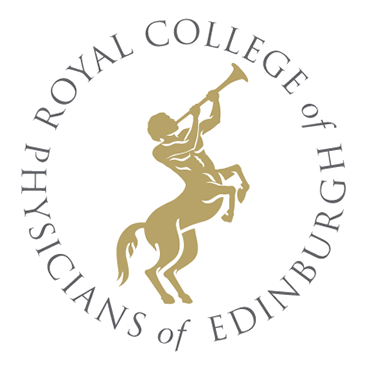
The Consultation Letters of Dr William Cullen (1710-1790) at the Royal College of Physicians of Edinburgh
[ID:2789] From: Dr E Harrison / To: Dr William Cullen (Professor Cullen) / Regarding: Mr Wood (of Thoresby) (Patient) / 1? April 1786 / (Incoming)
Letter from E. Harrison, concerning the case of Master Wood.
- Facsimile
- Normalized Text
- Diplomatic Text
- Metadata
- Case
- People
- Places
Facsimile
There are 4 images for this document.
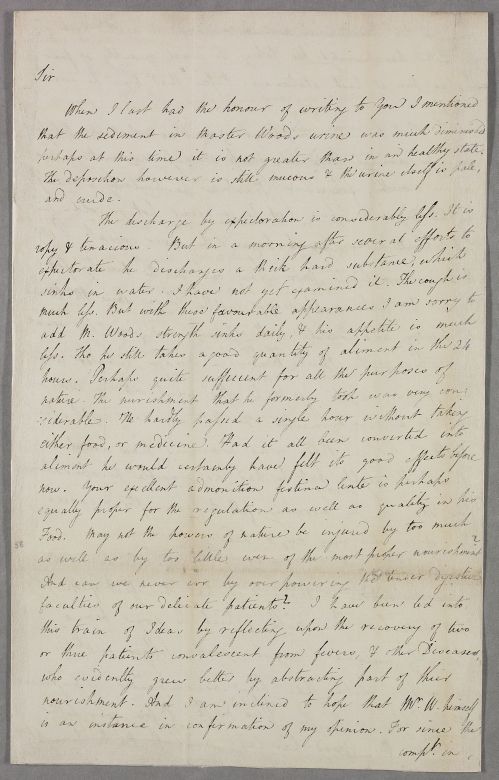
[Page 1]
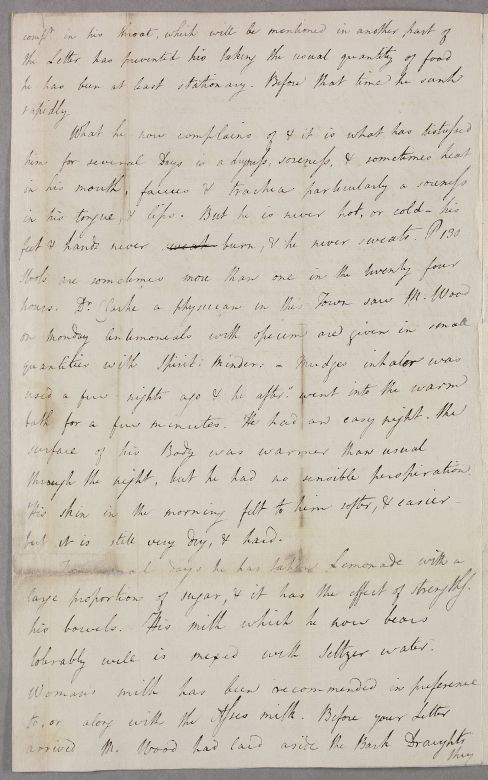
[Page 2]
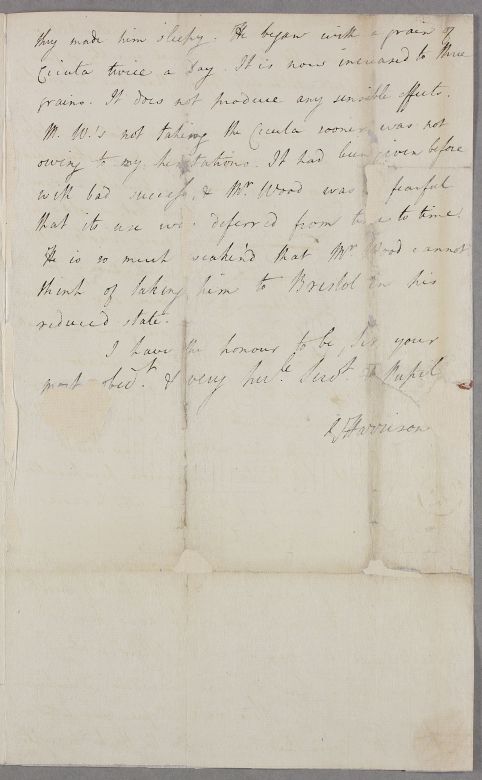
[Page 3]
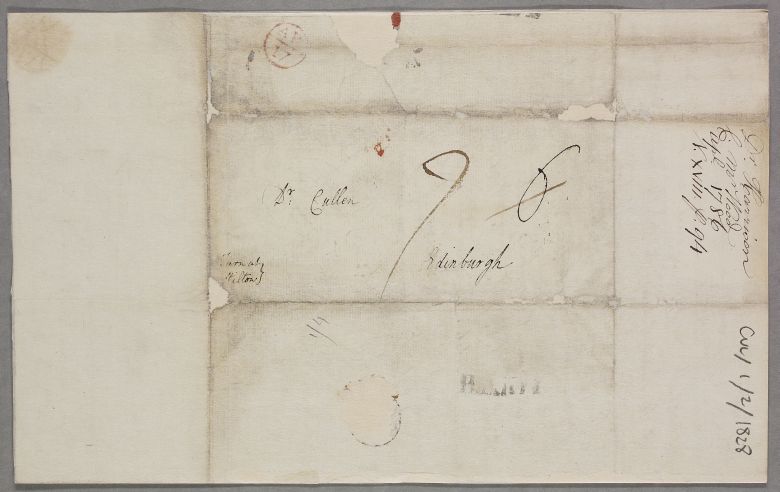
[Page 4]
Metadata
| Field | Data |
|---|---|
| DOC ID | 2789 |
| RCPE Catalogue Number | CUL/1/2/1828 |
| Main Language | English |
| Document Direction | Incoming |
| Date | 1? April 1786 |
| Annotation | None |
| Type | Authorial original |
| Enclosure(s) | No enclosure(s) |
| Autopsy | No |
| Recipe | No |
| Regimen | No |
| Letter of Introduction | No |
| Case Note | No |
| Summary | Letter from E. Harrison, concerning the case of Master Wood. |
| Manuscript Incomplete? | No |
| Evidence of Commercial Posting | Yes |
Case
Cases that this document belongs to:
| Case ID | Description | Num Docs |
|---|---|---|
| [Case ID:1155] |
Case of Master Wood, aged seventeen and recently a pupil at Westminster School, who has a bladder complaint attributed to a venereal infection and also a pulmonary weakness which proves fatal. |
12 |
People linked to this document
| Person ID | Role in document | Person |
|---|---|---|
| [PERS ID:5496] | Author | Dr E Harrison |
| [PERS ID:1] | Addressee | Dr William Cullen (Professor Cullen) |
| [PERS ID:5140] | Patient | Mr Wood (of Thoresby) |
| [PERS ID:1] | Patient's Physician / Surgeon / Apothecary | Dr William Cullen (Professor Cullen) |
| [PERS ID:5496] | Patient's Physician / Surgeon / Apothecary | Dr E Harrison |
| [PERS ID:5556] | Patient's Physician / Surgeon / Apothecary | Dr Clarke |
| [PERS ID:5141] | Patient's Relative / Spouse / Friend | Mr Wood (of Thoresby) |
Places linked to this document
| Role in document | Specific Place | Settlements / Areas | Region | Country | Global Region | Confidence |
|---|---|---|---|---|---|---|
| Place of Writing | Louth | Midlands | England | Europe | inferred | |
| Destination of Letter | Edinburgh | Edinburgh and East | Scotland | Europe | certain | |
| Mentioned / Other | Bristol | South-West | England | Europe | certain | |
| Place of Handstamp | Louth | Midlands | England | Europe | certain |
Normalized Text
Sir
When I last had the honour of writing to You I mentioned
that the sediment in Master Woods urine was much diminished
perhaps at this time it is not greater than in an healthy state.
The deposition however is still mucous & the urine itself is pale,
and [crude?].
The discharge by expectoration is considerably less. It is
ropy & tenacious. But in a morning after several efforts to
expectorate he discharges a thick hard substance, which
sinks in water. I have not yet examined it. The cough is
much less. But with these favourable appearances I am sorry to
add M. Woods strength sinks daily, & his appetite is much
less. Tho he still takes a good quantity of aliment in the 24
hours. Perhaps quite sufficient for all the purposes of
nature. The nurishment that he formerly took was very con¬
siderable. He hardly passed a single hour without taking
either food, or medicine. Had it all been converted into
aliment he would certainly have felt its good effects before
now. Your excellent admonition festina lent 1 is perhaps
equally proper for the regulation as well as quality in his
Food. May not the powers of nature be injured by too much
as well as by too little even of the most proper nourishment↑?↑
And can we never err by overpowering the tender digestive
faculties of our delicate patients? I have been led into
this train of Ideas by reflecting upon the recovery of two
or three patients convalescent from fevers, & other Diseases,
who evidently grew better by abstracting part of their
nourishment. And I am inclined to hope that Mr. W. himself
is an instance in confirmation of my opinion. For since the
[Page 2]
complaint in his throat, which will be mentioned in another part of
the Letter has prevented his taking the usual quantity of food
he has been at least stationary. Before that time he sunk
rapidly.
What he now complains of & it is what has distressed
him for several Days is a dryness, soreness, & sometimes heat
in his mouth, fauces & trachea particularly a soreness
in his tongue & lips. But he is never hot, or cold - his
feet & hands never sweat burn, & he never sweats. ✍P 130
✍
Stools are sometimes more than one in the twenty four
hours. Dr. Clarke a physician in this Town saw M. Wood
on monday Antimonials with opium are given in small
quantities with Spirit Mindereri - Mudges inhaler was
used a few nights ago & he afterwards went into the warm
bath for a few minutes. He had an easy night. The
surface of his Body was warmer than usual
through the night, but he had no sensible perspiration
His skin in the morning felt to him softr, & easier
but it is still very dry, & hard.
For several days, he has taken Lemonade with a
large proportion of sugar, & it has the effect of strengthening
his bowels. His milk which he now bears
tolerably well is mixed with Seltzer water.
Womans milk has been recommended in preference
to, or along with the Asses milk. Before your Letter
arrived M. Wood had laid aside the Bark Draughts
[Page 3]
they made him sleepy. He began with a grain of
Cicuta twice a Day. It is now increased to three
grains. It does not produce any sensible effects.
M. W.'s not taking the Cicuta sooner was not
owing to my hesitations. It had been given before
with bad success, & Mr. Wood was [so?] fearful
that its use was deferred from time to time.
He is so much weaken'd that Mr. Wood cannot
think of taking him to Bristol in his
reduced state.
I have the honour to be, Sir, your
most obedient & very humble Servant & Pupil
[Page 4]
Dr. Cullen
Edinburgh
Turn at
Stilton
Dr. Harrison
Concerning Mr Wood
April 1786
V. XVIII. P. 94
Notes:
1: Latin: 'Make haste slowly'
Diplomatic Text
Sir
When I last had the honour of writing to You I mentioned
that the sediment in Master Woods urine was much diminished
perhaps at this time it is not greater than in an healthy state.
The deposition however is still mucous & the urine itself is pale,
and [crude?].
The discharge by expectoration is considerably less. It is
ropy & tenacious. But in a morning after several efforts to
expectorate he discharges a thick hard substance, which
sinks in water. I have not yet examined it. The cough is
much less. But with these favourable appearances I am sorry to
add M. Woods strength sinks daily, & his appetite is much
less. Tho he still takes a good quantity of aliment in the 24
hours. Perhaps quite sufficient for all the purposes of
nature. The nurishment that he formerly took was very con¬
siderable. He hardly passed a single hour without taking
either food, or medicine. Had it all been converted into
aliment he would certainly have felt its good effects before
now. Your excellent admonition festina lent 1 is perhaps
equally proper for the regulation as well as quality in his
Food. May not the powers of nature be injured by too much
as well as by too little even of the most proper nourishment↑?↑
And can we never err by overpowering the tender digestive
faculties of our delicate patients? I have been led into
this train of Ideas by reflecting upon the recovery of two
or three patients convalescent from fevers, & other Diseases,
who evidently grew better by abstracting part of their
nourishment. And I am inclined to hope that Mr. W. himself
is an instance in confirmation of my opinion. For since the
[Page 2]
compt. in his throat, which will be mentioned in another part of
the Letter has prevented his taking the usual quantity of food
he has been at least stationary. Before that time he sunk
rapidly.
What he now complains of & it is what has distressed
him for several Days is a dryness, soreness, & sometimes heat
in his mouth, fauces & trachea particularly a soreness
in his tongue & lips. But he is never hot, or cold - his
feet & hands never sweat burn, & he never sweats. ✍P 130
✍
Stools are sometimes more than one in the twenty four
hours. Dr. Clarke a physician in this Town saw M. Wood
on monday Antimonials with opium are given in small
quantities with Spirit: Minder: - Mudges inhaler was
used a few nights ago & he afters. went into the warm
bath for a few minutes. He had an easy night. The
surface of his Body was warmer than usual
through the night, but he had no sensible perspiration
His skin in the morning felt to him softr, & easier
but it is still very dry, & hard.
For several days, he has taken Lemonade with a
large proportion of sugar, & it has the effect of strengthg.
his bowels. His milk which he now bears
tolerably well is mixed with Seltzer water.
Womans milk has been recommended in preference
to, or along with the Asses milk. Before your Letter
arrived M. Wood had laid aside the Bark Draughts
[Page 3]
they made him sleepy. He began with a grain of
Cicuta twice a Day. It is now increased to three
grains. It does not produce any sensible effects.
M. W.'s not taking the Cicuta sooner was not
owing to my hesitations. It had been given before
with bad success, & Mr. Wood was [so?] fearful
that its use was deferred from time to time.
He is so much weaken'd that Mr. Wood cannot
think of taking him to Bristol in his
reduced state.
I have the honour to be, Sir, your
most obedt. & very hule. Servt. & Pupil
[Page 4]
Dr. Cullen
Edinburgh
Turn at
Stilton
Dr. Harrison
C. Mr Wood
Apl. 1786
V. XVIII. P. 94
Notes:
1: Latin: 'Make haste slowly'
XML
XML file not yet available.
Feedback
Send us specfic feeback about this document [DOC ID:2789]
Please note that the Cullen Project team have now disbanded but your comments will be logged in our system and we will look at them one day...

